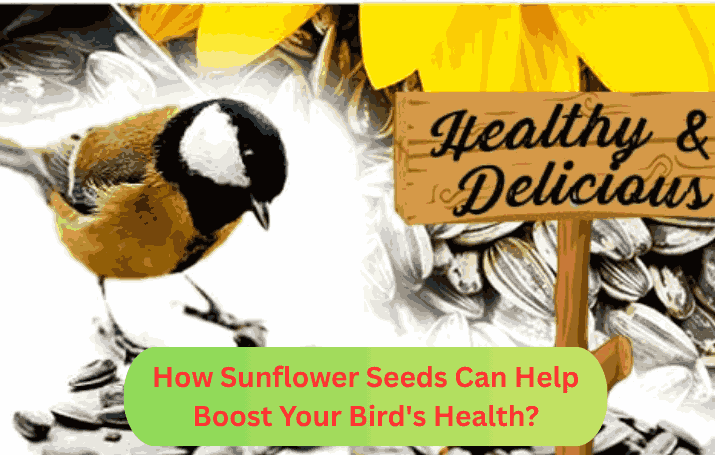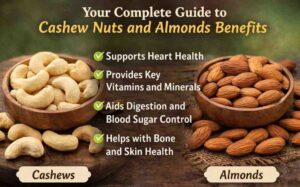
How Sunflower Seeds Can Help Boost Your Bird’s Health?

Introduction
People who own birds frequently want to give them the greatest care possible, from a cage that is safe and pleasant to toys that keep them busy. But we often forget the most important thing about a bird’s health: its nutrition. Birds require more than just seeds to live well; however sunflower seeds are one of the best kinds of seeds for them. Sunflower Seeds are high in nutrients, easy to digest, and most pet birds adore them. When fed the right way, they can greatly enhance your bird’s health.
Let’s talk about how sunflower seeds are good for birds, how to feed them properly, and what you need to do to avoid making typical feeding blunders in this post.
Nutritional Powerhouse for Birds
Sunflower seeds are loaded with essential nutrients that birds need for healthy growth and activity. They contain:
- Healthy fats: Provide birds with energy, especially small and active species like parakeets and finches.
- Vitamin E: Supports immune function and maintains healthy feathers and skin.
- Magnesium and selenium: Strengthen bones and play a role in enzyme function.
- Protein: Essential for muscle maintenance and growth.
These nutrients make sunflower seeds a great supplement, especially for birds recovering from illness or stress. However, moderation is key, as overfeeding can cause imbalances.
Improves the health and shine of feathers
People who own birds say that when they feed their birds sunflower seeds, especially the black oil kind, the feathers get thicker, shinier, and more colourful. There’s a reason for this. Because it has a lot of fat, especially linoleic acid, feathers grow in a better way.
When skin and feather cells are hurt, vitamin E helps them heal. This makes birds look clean and shiny. Some birds need extra energy during moulting or feather growth. Sunflower seeds can help them by giving their bodies that extra energy.
Sun Flower Seeds Supports Immune System and Disease Resistance
Animals, including birds, can get sick, especially with breathing and digestive problems. Sunflower Seeds contain powerful antioxidants like vitamin E and selenium. Cells are protected from oxidative stress and inflammation, which makes it easier for your bird to fight off diseases.
A few sunflower seeds a day can help their immune system naturally during colder months or stressful times, like when they move or come back from a trip. This way, they don’t have to rely on synthetic vitamins as much.
Great for Training and Mental Stimulation
Birds are very smart, and they love to work for their food or solve problems. As a treat during training, sunflower seeds can be great. Trainers often use them to reward good behaviour because they are small, tasty, and easy to take.
Additionally, hiding sunflower seeds in foraging toys or paper wrappers keeps birds’ minds busy by making them feel like they are looking for food in the wild. For example, plucking feathers or screaming nonstop are signs of boredom.
Encourages Natural Eating Behaviour
Your bird’s beak and mouth will stay active when you feed it whole sunflower seeds with shells. Birds love to break open the shell to get to the soft seed inside. This makes their beak stronger, keeps it in good shape naturally, and feeds their need to find food and play with things.
Because their beaks grow all the time, the process is especially helpful for pet parrots and cockatiels. Giving them shelled seeds once in a while will cut down on their need for fake trimming or chew toys.
Feeding Guidelines: How Much Is Too Much?
While sunflower seeds are beneficial, overfeeding can lead to problems like obesity, fatty liver disease, and nutritional imbalance. Here are some safe tips:
- Offer in moderation: About 1–2 teaspoons per day for medium-sized birds is sufficient.
- Use as treats: Instead of making sunflower seeds the main diet, offer them as a reward or snack.
- Mix with other seeds: Combine with millet, canary grass seed, or formulated pellets.
Use unsalted, raw seeds: Avoid roasted or flavoured ones, as added salt and preservatives are harmful to birds.
FAQs About Hazelnuts and Weight Loss
Q1. Are black oil sunflower seeds better than striped ones for birds?
Yes. Black oil sunflower seeds have thinner shells and higher oil content, making them easier to eat and more nutritious for birds.
Q2. Can sunflower seeds replace regular bird food?
No. Sunflower seeds should be a supplement or treat, not the sole diet. Birds need various foods, including fresh fruits, vegetables, and grains.
Q3. Are sunflower seeds safe for baby birds?
Only in small amounts and under proper guidance are sunflower seeds safe for baby birds. It’s best to offer soft, hulled seeds that are easier to digest.
Q4. Do wild birds also benefit from sunflower seeds?
Absolutely! Many wild bird feeders use black oil sunflower seeds because they attract songbirds, finches, and woodpeckers while offering energy-dense nutrition.
Q5. Can sunflower seeds cause any health issues in birds?
If overfed, yes. Too many sunflower seeds can lead to obesity, calcium deficiency, and behavioural dependency on one type of food.
Final Thoughts
When given the right way, sunflower seeds can be good for your bird’s health. They’re full of nutrients that help keep your immune system strong, give you bright feathers, and even keep your mind sharp. As with any treat, though, they shouldn’t be given too often. If you want to make changes, you should always talk to your vet first.
If you want to improve your pet’s health and happiness in the long run, you should feed them sunflower seeds. This is true whether your pet is a playful parrot, a happy canary, or a curious budgie.



